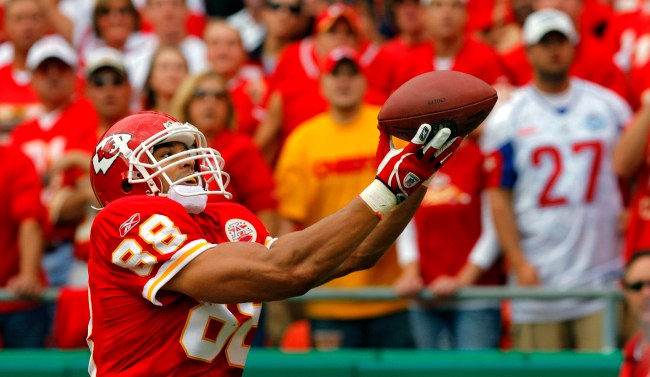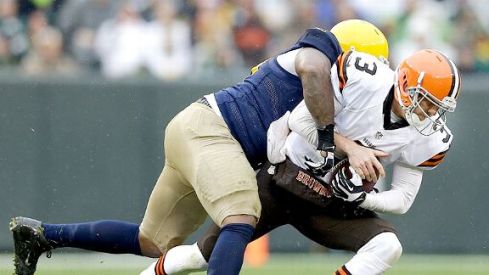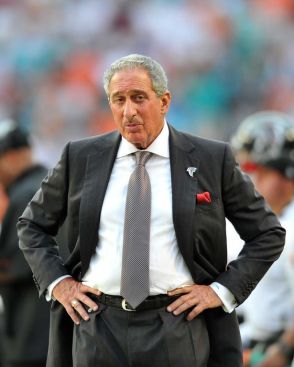
The day after “The Decision,” almost exactly four years ago, we went to my wife’s friend’s house for lunch. Her husband is a sports guy, and, Cleveland fans being a novelty in New Jersey, I knew I was going to have to talk about it. And talk and talk and talk. I certainly got sick of explaining what it’s like to be a Cleveland fan in those days—some of the ideas I’ve laid out here—and how this thing, much as it sucked, kind of fit. It made sense in the frame of a cosmic self-pity.
So this past Saturday, I went out for bagels at home in Brooklyn wearing my Cavs hat, as I’ve done here and there for a couple of weeks, since it appeared on the top of the pile in the closet. It’s a blue and orange late-80s throwback, from the last time the Cavs were remotely relevant pre-LBJ. If you don’t remember those teams, they were basically that era’s version of today’s Pacers—a balanced, well-oiled regular season machine undone in the playoffs by a transcendent talent (ask Craig Ehlo about that). A guy at the bagel place started up, and the talking began again. Different tone this time, of course—whether they should give up Wiggins for Love—but the same curiosity about what is going on inside the head of a Cavs fan. I can’t speak for all of us, especially people actually in Cleveland, who I’m sure experienced these ups and downs differently than a person like me. You see, I left Cleveland, too. And unlike Lebron, I have no intention of going back (outside of visiting my parents and taking my son to Cedar Point when he’s old enough to appreciate The Gemini). But I can speak for myself about what it’s like to be on the fringes of the most unusual sports narrative of recent decades.
All that talking four years ago did help me eventually articulate what I thought hurt so much about The Decision for a Cleveland fan. And the intervening four years—miserable basketball and management and bizarre, probability-vortex luck—helped me get over it. Even then, I couldn’t really blame the man. That 2010 Cleveland team was crap and had little capacity to improve (despite, according to sources now, LBJ’s best recruiting efforts). As I’m sure all now realize, the pain of the The Decisionwas a product of tone-deafness, though describing it that way is a bit of an understatement. He was supposed to be The One—both hometown boy and the best in the world. We hoped that he “got it,” that he could realize that he somehow meant more to the city than putting a round ball in a hoop. This idea, of what sports means to Cleveland, was best articulated in Wright Thompson’s Believeland Outside the Lines piece for ESPN—to this day the single best piece of sportswriting about Cleveland I’ve ever read. The hangover of its peak, as a hub of early-century manufacturing, came in the 1970s—The Mistake by the Lake. The city’s recovered from that, with ups and downs along the way, but it has never stopped bleeding away the trappings of urban significance. Its status as a three-sport town, despite a population smaller than Jacksonville, Albuquerque, Omaha, and Tulsa, was a callback to its glory days, one of the things that kept Cleveland from just fading away. We mustn’t forget the art museum, symphony, universities, hospitals, etc., but those don’t nearly have the hold, domestically or globally, of being one of the 12 American cities with teams from all three major sports—a club so excusive that it does not count Los Angeles, Dallas, and San Francisco as members. And that is why sports figures so large in Cleveland despite decades of failure—it makes the city matter. LBJ missed this idea in the form, if not the content, of The Decision, and this is why some Cleveland people on my Facebook feed are confused, ambivalent, or bitter about the Cavaliers signing the best basketball player alive. His opting out of being The One was more than a sports decision, but touched some nerve in the Midwestern lizard-brain—one connected to the same pathways as survival, significance, identity. For that reason, people will boo him when he next tosses the chalk at Quicken Loans Arena. Make no mistake.
Whatever disappointment (vitriol?) I had ended very cleanly when I read Scott Raab’s The Whore of Akron. I never put down a book unfinished, but damn I hated that book. Simply put, Raab is a horrible shit, and to turn to a horrible shit looking for some clarity is to go to a very dark, smelly place. This book was such an act of self-loathing, of projection of self-loathing, that I needed a shower after I read it. It was too much, too hopeless, too oppressive, too icky. Hope is embedded in Cleveland’s character. Talk about tone-deaf. All that was left was residue: defeating and defeatist, consuming, silly. (I also credit the excellent and dark movie Big Fan with helping me put this into perspective a little bit—while I make the argument that sports can be more than trivial, the movie’s portrayal of insane, blinding over-emotional fandom is healthy to watch when you’re worried that you care too much.) I’m half-inclined to read The Whore of Akron again, but I simply don’t want to spend one more second in Raab’s pestilential presence.
If I had gotten over LBJ’s departure, and in some glancing way begun to appreciate just how damned good he had become (where was that post game in Cleveland?), prior to all this I still had some ambivalence about the idea of him coming back. Though I’m a naturally pretty cynical person, Cleveland sports makes me want to be an optimist. I figured that if LBJ had decided he wouldn’t be The One, someone else would and it would still be sweet. Kyrie didn’t seem to be wearing the mantle very well, but then there was Wiggins. Hoyer, Manziel, Gordon, Brantley, Kluber? Outlook hazy.
Chagrin Falls, man. The One became the greatest villain since Art Modell and then, improbably, became The One again. If someone had sat me down and asked me to specify a set of conditions under which I would welcome LBJ back to Cleveland, the letter he dictated to Lee Jenkins kind of nailed it. Not gonna lie, I teared up a bit when I read it on the subway. Cynically: it was a beautiful piece of PR. But then again: He does get it! He sees now why he mattered so much. (Is anyone else uncomfortable with how many old, white sportswriters are describing that letter as “mature”?) There’s that silly secret sunniness that lies in the heart of every Cleveland sports fan except the most embittered. I’ve decided I do not have mixed feelings about Lebron’s return. The first thing atlswami texted me after “I’m Coming Home” (is that how it will be remembered?) was that he wasn’t happy for me, but he was happy for my son. Now, my sports inheritance to him maybe won’t be so poisonous. Me, I’m happy for Cleveland. They— not “we”—have got another shot. And, weirdly, the entire sports world, minus the handful of sports fans in Miami and those in Cleveland who hold a grudge, seems to have a smile on its face. Right now, the manager of the Indians, the quarterback of the Browns, and the greatest Cavalier of all time are all homegrown. It’s a nifty moment.
I had this theory—atlswami will attest to it—that LBJ had voluntarily become a Judas, both so he could get some titles and remove that withering and surely tiring speculation, and so that the Cavs could tank the shit out of it and rebuild so he could come back to something promising. It was trying to impose a story on something I didn’t like, but that is, functionally at least, what happened. Think for a second about all the little things that even made this a possible outcome. The #1 picks—three in four years (on top of the one that put LBJ in Cleveland in the first place). The Mike Brown debacle, then picking such a strange and kind of perfect replacement in David Blatt (who I am super-bullish on). You have Dwyane Wade’s balky knees, Riley not wanting to keep Mike Miller around. The fact that Varejao, a LBJ favorite, managed to get hurt enough to prevent a trade that seemed inevitable. Actually maintaining the cap space for what seemed like a pipe dream. Even before LBJ decided to sign, I feel like the usual Cleveland optimism was taking hold. A lot of people love the coaching hires. Wiggins is the right piece at the right time. There is this idea that Irving and Waiters will figure something out and aspire to be Paul and Wade instead of Marbury and Francis. Hell, even Anthony Bennett suddenly seems promising.
The cynical, including Deadspin’s Drew Magary, figure that the latest move is simply a replay of 2010, except with a much more polished turd (Magary also wrote this, this, and this about LBJ). Basketball-wise, it is. In 2010, LBJ left an inadequate team built around and dedicated to him for a better one, alongside two perennial all-stars. In 2014, he left an inadequate team built around and dedicated to him for . . . well, not a better team exactly, but one with much, much better prospects over the next five years or so. A team so loaded with assets that a few smart decisions and a little professional development could turn it into the dynasty that the Heat, with their reliance on two men, never really had a shot at becoming.
Plus, he gets a different role than he had in Miami (and the first time in Cleveland), where he was forced to be a workhorse—picking up all the slack from resting Wade—and a conductor. He was good at it, but it never seemed his nature. He’ll never be like Jordan and there’s nothing wrong with that. He wants to be liked too much, he wants to pass too much. He’s not, in a word, maniacal. It seems like he’s finally sorted that out about himself and now he has a chance to be a white hat, to pass at the end of games without apology. Perhaps he wants to prove that he’s the best ever at making others better. More sunniness.
He might also make Cleveland a destination for other players. It’s not something he was really able to accomplish before—see the Windhorst piece linked earlier—but that could be different now. And this will be the subject of the talk until the season starts—thanks, bagel guy. Mike Miller, Ray Allen, etc., would be nice for continuity and to make sure that the locker-room culture really changes for good. Kevin Love clearly the most obvious, intriguing, and complementary option. How I would love to get him without giving up Wiggins, who seems like the perfect mentee for LBJ. That said, Wiggins is potential and Love is now and only 25. But then again, Wiggins is cheap and Love would mean three huge contracts and little flexibility in case of injury. There’s a few other pieces the team needs—a backup point guard, a defensive big man (Jason Collins would be a feel-good addition for a year and I’m good with Ekpe Udoh and Emeka Okafor for reasons that aren’t clear to me), and shooters (if Miller and Allen are out). The point here is that the Cavs are at a clear inflection point—they either come up smaller than ever before or become the dynasty that Cleveland hasn’t had since Otto Graham and Jim Brown. Somehow it doesn’t feel like there’s an in between. Be bold and be wise, my friends.
 Peria Jerry—whose first name will forever be pronounced in Atlanta as “pariah”—is retiring from football after five meh-to-blech seasons in the NFL. The Falcons chose the Ole Miss product with the 24th pick in the 2009 draft, despite his missing the first month of his senior year due to knee surgery for a torn meniscus. They also ignored the fact that he’d be turning 25 before his first pro season ever began.
Peria Jerry—whose first name will forever be pronounced in Atlanta as “pariah”—is retiring from football after five meh-to-blech seasons in the NFL. The Falcons chose the Ole Miss product with the 24th pick in the 2009 draft, despite his missing the first month of his senior year due to knee surgery for a torn meniscus. They also ignored the fact that he’d be turning 25 before his first pro season ever began.










